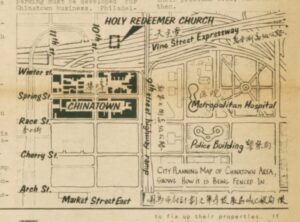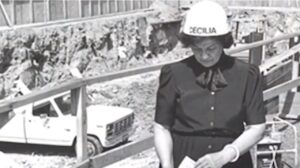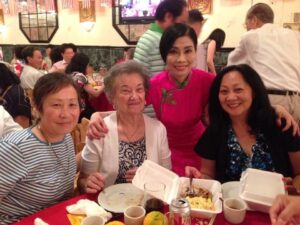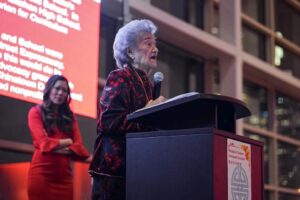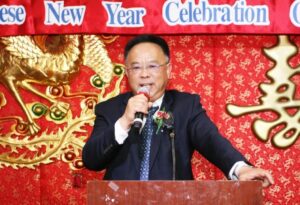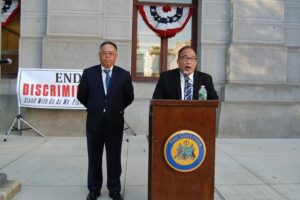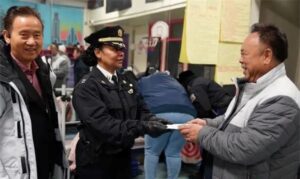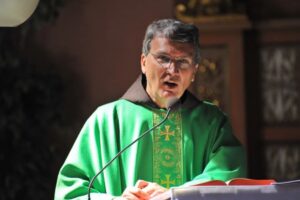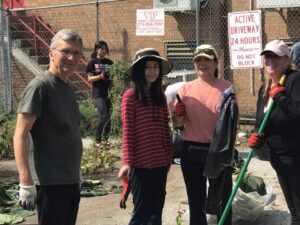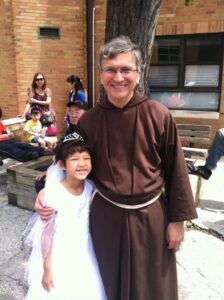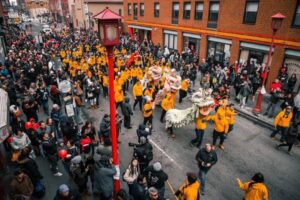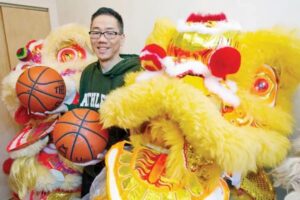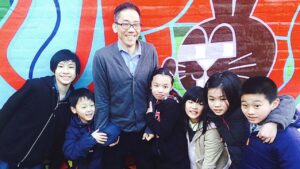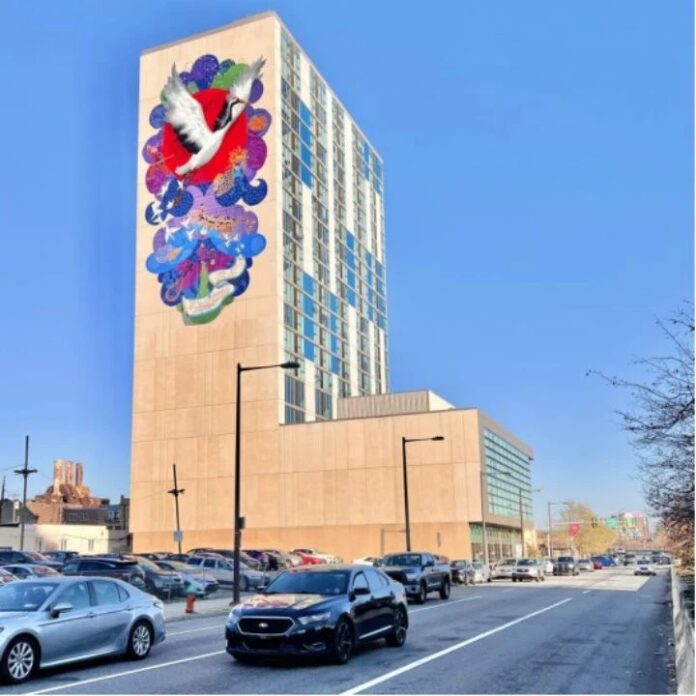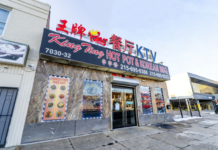聚合社团力量,为费城华埠赋能!
“Empowering Chinatown: The Indispensable Impact of Supportive Organizations”
记者Reporter:Bei Li
校对Proofreader:Cory Clark, Keano Tsao
2023年4月,为了庆祝费城华埠建成153周年,一幅主题为“承前启后”的巨幅壁画在唐人街鼎华大厦亮相。该壁画不仅打破了费城最高壁画的纪录,成为费城唐人街新符号,而且被费城市旅游局列为费城旅游的新地标。
In April 2023, to celebrate the 153rd anniversary of the founding of Philadelphia’s Chinatown, a massive mural with the theme of “The Past Supporting the Future” was unveiled at Crane Chinatown. The mural broke the record for being the highest mural in Philadelphia and has become a new symbol of Chinatown. It is listed as a landmark of Philadelphia tourism by the Philadelphia Convention & Visitors Bureau.
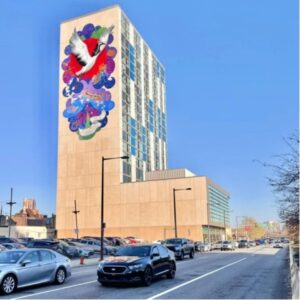
图片由艺术家蔡陈林提供
Photo Credit to Artist Chenlin Cai
这幅壁画由代表过去、现在和未来的三部分内容组成。在壁画中的一卷画轴上,描绘了费城唐人街历史上的几个重要时刻。上世纪60年代,唐人街居民抗议万安街(Vine Street)高速公路建设的场景,就是其中之一。
The mural consists of three parts representing the past, present, and future. Several important moments in the history of Philadelphia’s Chinatown are depicted on one scroll within the mural. The scene of Chinatown residents protesting the construction of the expressway on Vine Street in the 1960s is one of them.
为生存而战
Fight For Survival
1966年,宾州交通部公布了万安街高速公路(Vine Street Expressway)的新计划,该计划准备拆除费城华埠天主教教堂和培德学校(the Holy Redeemer Chinese Catholic Church and School)。与此同时,费城市启动了大都会医院(Metropolitan Hospital)和东市场街(Market Street East)的计划,从四面围堵华埠,唐人街岌岌可危。
In 1966, PennDOT (Pennsylvania Department of Transportation) unveiled a new plan for the Vine Street Expressway to be extended, effectively splitting Chinatown into two halves. The plan included the demolition of the Holy Redeemer Chinese Catholic Church and School to make way for the highway. Simultaneously, the city initiated plans for Metropolitan Hospital and Market Street East, effectively enclosing Chinatown on all sides and preventing expansion.
万安街高速路的原始施工计划示意图
Schematic diagram of the original construction plan for the Vine Street Expressway
不过,费城华埠并不是那么容易被击垮。唐人街的居民们团结起来,为自己的家园和社区而战。1966年3月27日,社团、企业主、教会领袖和居民们聚集在安良工商会(On Leong Merchants’ Association),讨论如何应对政府机构提出的这项严重影响社区的计划。在此次会议上,成立了促进和保护唐人街社区委员会(the Committee for the Advancement and Preservation of the Chinatown Community)。1969年,费城华埠发展会(PCDC)成立。
However, Chinatown did not yield easily. Its residents united to defend their homes and community. On March 27th, 1966, various groups, including associations, business owners, church leaders, allies, and residents gathered at the On Leong Merchants’ Association to strategize on ways to counter government’s plans, which would significantly impact their community. It was from this meeting that the Committee for the Advancement and Preservation of the Chinatown Community was born. In 1969, this committee was later incorporated into the Philadelphia Chinatown Development Corporation (PCDC).
费城华埠发展会的创始人之一,今年已经93岁高龄的Cecilia Moy Yep女士,回忆起当时的情景,好像就在昨天。“我有点不知所措,那时候我只有32岁,丈夫刚刚去世,拉扯着三个年幼的孩子。加上我对于城市规划之类的事情也不了解,所以当时我不知道自己能做多少。但是我知道,我们必须采取行动。我们向唐人街的居民们通报情况,把愿意帮忙和出力的人组织起来。有人负责了解和更新信息,有人负责和市政府沟通交涉。要知道,当时有很多不同的政府部门被牵扯进来,非常复杂。”
Ms. Cecilia Moy Yep is one of the founders of the Philadelphia Chinatown Development Corporation. Now 93 years old, Ms. Yep recalled the scene as if it happened just yesterday. ‘I was overwhelmed; I was only 32 years old, my husband had just passed away, and I had three young kids. Plus, I didn’t know much about urban planning and such, so I wasn’t sure how much I could do at the time. But I knew we had to take action. We briefed the residents of Chinatown, organized people willing to help and contribute; many different government departments were involved; it was very complicated.
年轻时的Yep 资料照片
Young Yep,Profile Photo
Cecilia Moy Yep的父亲来自中国,母亲是德国人。在8岁的时候,她跟随父母搬到费城唐人街居住,算起来已经在费城唐人街住了快86年。
“我想我的父亲搬到唐人街很大一个原因就是想让我们熟悉中国文化,我们也是费城华埠的第一个天主教家庭,我和所有的兄弟姐妹们都从天主教培德学校毕业。我和我的邻居从七年级开始就是同学,现在我们都90多岁了,还是好朋友。这就是为什么我们必须保护费城天主教教堂,保护我们的唐人街,因为它对很多人来说都意义非凡。”
Cecilia Moy Yep’s father is from China, and her mother is German. From the age of 8, she followed her parents to live in Chinatown, where she has now for almost 86 years. “I think a big reason my father moved to Chinatown was to familiarize us with Chinese culture. We are also the first Catholic family in Philadelphia’s Chinatown. All my brothers and sisters and I have graduated from Catholic School. My neighbors and I have been classmates since 7th grade, and now we’re all in our 90s and still good friends. That’s why I think we have to work hard to protect the Catholic Church in Philadelphia and protect our Chinatown because it’s so important to a lot of people.”
Yep第一轮拯救费城唐人街的抗争开始于1960年。“我收到了驱逐通知,”她说。当时,费城市要求Yep放弃她在唐人街的家宅,为一条新的地铁隧道腾地方,但是并没有为她提供一个新住处。“我一直呆在那里,”她说,“他们建造地铁隧道,把泥土堆得很高,一直堆到我家的三楼。”
Yep’s first campaign to protect Philadelphia’s Chinatown began in 1960. At the time, the City of Philadelphia asked Yep to give up her Chinatown home to make room for a new subway tunnel but did not offer her a new home. “I was served an eviction notice, but I decided to stay there,” she said, “and they built the subway tunnels and piled the dirt high up to the third floor of my house.”
Yep一直“坚守”在费城唐人街的家里,直到费城市建造了唐人街历史上第一个新的住房开发项目,Yep才搬到了新家,现在她还住在那里。在PCDC所有成员和华埠居民的共同努力下,费城华埠在第二场“生存之战”中活了下来。交通官员同意缩减万安高速公路的计划,费城华埠天主教教堂和培德学校至今仍然“屹立不倒”,唐人街还是华人社群的家园。
Yep remained firmly rooted in her residence within Philadelphia’s Chinatown until the city of Philadelphia inaugurated its housing development in the neighborhood’s history. After this development was completed, Yep relocated to a new residence, which is where she continues to reside today.With the joint efforts of all PCDC members and Chinatown residents, Philadelphia Chinatown survived the second “Battle of Survival.” Transportation officials finally agreed to reduce the plans for the Vine Expressway to save the Holy Redeemer Chinese Catholic Church and School, which stands to this day.
图片由受访人提供(图中左二为Yep)
Photo Credit to Yep
1974年,Yep被任命为费城华埠发展会执行董事。在此后的25年中,她作为该组织的核心领导人,一直站在为费城华埠“抗争”的最前排。PCDC不仅对企图侵占唐人街的一系列项目进行了游说和抗议,同时也通过住宅开发项目,让华人群体、特别是低收入群体,能在唐人街安居乐业。
In 1974, Yep was named executive director of the Philadelphia Chinatown Development Corporation. In the following 25 years, as the core leader of the organization, she has been at the forefront of the fight for Philadelphia’s Chinatown. Over the past few decades, PCDC has not only lobbied and protested against a series of projects that attempted to occupy Chinatown but has also developed residential projects to allow Chinese groups, especially low-income groups, to live and work in Chinatown.
“联邦政府一直为大城市提供资金,进行城市改造和清理。因为由于历史原因,美国所有的华埠都位于城市的贫民区。政府不想把这些区域变得更好,而是想直接清理了完事。在某种程度上,这也是对华人的一种歧视。我们只能自己变得更强,努力和政府抗争,这是唯一的解决方法”。
“The federal government has funded major cities for urban renovation and cleanup. Because for historical reasons, all the Chinatowns in the United States are located in poor areas of the city. The government doesn’t want to make these areas better, just clean them up. To a certain extent, this is also a kind of discrimination against the Chinese. We can only become stronger ourselves and work hard to fight the government. This is the only solution.”
作为PCDC的负责人,Yep不仅将费城唐人街从外部威胁中拯救出来,而且在1999年发起通过了一项法案,将唐人街定为特区。这项法律重新划分了万安街以北和唐人街对面44英亩未完全开发的土地,允许社区扩张,为子孙后代打下一片江山。
As PCDC director, Yep had not only rescued Chinatown from outside threats during her lifetime, but also saved the neighborhood for future generations by initiating the passage of a bill in 1999 that established Chinatown as a Special Zoning District. This law rezoned 44 acres of underutilized land north of Vine Street and across from Chinatown, allowing for the community’s expansion.
图片由受访人提供
Photo Credit to Yep
今年已经93岁的Yep,因其保护唐人街社区的工作而获得1999年费城奖(the 1999 Philadelphia Award)。虽然已经在2000年从PCDC退休,但是Yep一直是PCDC和费城华埠的精神领袖,被尊称为“费城唐人街教母”。“唐人街是我的家,我仍然是董事会成员,会参与一些活动。只要我能帮忙,我都会愿意去做。虽然我现在已经九十多岁,没有太多的力气和精力,但是当我必须发声时,我会发声的。”
Yep, who is 93 years old this year, received the 1999 Philadelphia Award for her work representing and protecting the Chinatown community. Although she retired from PCDC in 2000, Yep has always been the spiritual leader of PCDC and Philadelphia Chinatown and is honored as “the godmother of Chinatown in Philadelphia.” “Chinatown is my home. I’m still on the board, and I’m involved in some activities. If I can help, I’m willing to do it. But I’m in my nineties now, and I don’t have a lot of strength and energy, but when I have to, I will speak.”
为发展而战
Fight For Development
在大费城华人圈,还有一位总是红光满面、笑容可掬的老大哥,他就是宾州华人侨团联盟秘书长、大费城华人餐馆协会会长朱枫。时隔多年,他对自己进入华人“社团圈”的情景还记忆犹新。
“2003年,当时侨学界秘书处要选出一个秘书长。有人就提名我。第二个星期,大家在一个叫‘崇正会’的侨团开会,叫我去开会。结果我迟到了,我一走进去,大家都起立鼓掌,我问这是怎么回事,他们说‘我们刚才选举了,你现在是我们的秘书长,大费城侨学界华人社团联席会议秘书长。’我就正式开始为华人社团做事。”
In the Chinese community in Greater Philadelphia, there is another big brother who is always rosy and smiling. He is Steven Zhu, secretary-general of Pennsylvania United Chinese Coalition and president of the Greater Philadelphia Chinese Restaurant Association. After many years, he still has a fresh memory of his entry into the Chinese community circle. “In 2003, The Philadelphia Chinese Community Organization United (PCCOU) planned to elect a secretary-general. Someone nominated me. In the second week, they held a meeting and called me to go too. It turns out I was late, and there was a standing ovation as soon as I walked in. I asked, ‘What’s going on?’ They said, ‘We just voted, and you’re now our Secretary-General’. I officially started working for the Chinese community.”
图片由受访者提供
Photo Credit to Steven Zhu
虽然刚入圈的时候有点儿“误打误撞”,但是朱枫很快意识到,为社区做事是一个很复杂的工程,因为“华人以个体为重,缺乏团结的意识,很难联合起来”,朱枫说,“我曾经写过一篇文章,讲为什么会有中国城。中国人靠努力成功,但是也会招来别人的嫉妒。所以华人们聚在一起,背靠背来获得安全感。但只是背靠背,而不是手牵手,很难共享共同利益。”
Although it was a bit unexpected when Steven Zhu first entered the circle, he quickly realized that doing things for the community was a highly complex project because oftentimes “Chinese people focus on the individual and lack the awareness of unity, so it is difficult to unite.” Steven said, “I once wrote an article about why there is a Chinatown. Chinese people succeed through hard work, but it also attracts the envy of others. So Chinese people gather back to back to gain a sense of security. But only back to back, instead of holding hands, it is difficult to share common interests.”
2005年初,费城出台了宵禁法案,根据该项法律要求,主要居民区的外卖餐厅必须在晚上11点结束营业。此法案的目的是打击居民区的犯罪活动,“促进安全感”,但是警方在执行宵禁法时,却针对中餐馆,对其他族裔经营餐馆的违法行为视而不见,有些中餐馆并不在执法区域内也会收到罚单。
In early 2005, Philadelphia introduced a curfew law. According to the law, the takeout restaurants in the residential areas must close at 11pm. The purpose of this bill was to curb criminal activities in residential areas and “promote a sense of safety,” but when the police enforced the law, they targeted Chinese restaurants and disregarded the illegal behavior of restaurants run by non-Chinese owners. Some Chinese restaurants that are not within the law enforcement area also received fines.
当时,华人餐馆和外卖店的老板们并没有一个组织能把大家团结起来一致对外,大费城华人餐馆协会应运而生。从来没有开过餐馆,绝对是“业外人士”的朱枫成为该协会的创始人之一。他和协会的领导层带领着几十家受到影响的中餐外卖店经营者,前往费城市政厅举行反宵禁法大集会,并积极谋求用法律手段推翻这一“恶法”。
During that time, Chinese restaurant owners lacked an organization to unite them, leading to the establishment of the Greater Philadelphia Chinese Restaurant Association. Surprisingly, Steven Zhu, who had never owned a Chinese restaurant, became one of the founders of the association. He and the other leaders of the association led dozens of affected Chinese takeout restaurants to rally against the ‘curfew bill’ and took their concerns to Philadelphia City Hall. They organized a large protest, seeking to challenge the unfair law and enforcement through legal means.
朱枫和欧大卫在宵禁法案示威活动中
Steven Zhu and David Oh during the curfew bill demonstration outside City Hall
图片由受访者提供
Photo Credit to Steven Zhu
“我只是为社区做了一点儿事,替别人想多点儿,做一些别人做不了的事情,因为我会讲一些英文,很多餐馆业主不讲英文,我就帮大家做一些和市府沟通的事情,就是这样。我以前都说不出来‘NO’,只要有人来找帮忙,我都会答应,结果越做事情越多。”
“I just do a little bit for the community, think a little more for others, and do things that others can’t do because I can speak some English, and many restaurant owners don’t speak English, so I help you communicate with the city government. That’s it. I couldn’t say ‘NO’ before; as long as someone came to ask for help, I would say yes. As a result, the more things I did, the more things came to me.”
费城中餐外卖店老板反对宵禁法案的抗争长达15年。2018年,在朱枫先生的呼吁与带动下,费城中餐业者收集多年受恶法侵害的证据达142页,要求费城法院裁定宵禁法无效和警察执法不公。令人欣慰的是,美国联邦法院最终判定费城宵禁法违宪,费城市政府将宵禁法撤回,并向中餐业主赔偿了265000美元。
It took 15 years for Chinese restaurant owners in Philadelphia to fight against the curfew bill. In 2018, driven by Steven Zhu’s call, the owners compiled 142 pages of evidence proving that they had been violated by vile laws over the years and asked the Philadelphia court to rule that the curfew law is invalid or to at least end the unfair law enforcement by the city police. It is gratifying that the U.S. federal court eventually ruled that the Philadelphia curfew law was unconstitutional, and the city government withdrew the curfew law and compensated the Chinese restaurant owners with $265,000 in total.
在反对宵禁法案的过程中,朱枫发现,华人想要安居乐业,除了要团结一致不断抗争之外,也需要更多被主流社会理解。“我这么多年做的最多的工作就是把主流社会引进给华人社区。那个时候,很多华人社团都是自己组织活动,自己玩,但是外界不知道你在做什么,包括现在也是这样,很多人天天在微信上抱怨,但是主流社会一句都听不见,有什么用?”
In opposing the curfew bill, Steven Zhu discovered that if the Chinese want to live in peace and contentment, in addition to being united and constantly fighting for their rights, they also need to be more understood by non-Chinese society. At that time, many Chinese associations organized their activities and played by themselves, but the outside world didn’t know what they were doing. Including now, many people complained on WeChat daily, but the mainstream society couldn’t hear a word. What’s the use?”
在宵禁法案的时候,大费城华人餐馆协会只是想改变法案,而不是推翻法案。“但是我们去找人家的时候,人家说中餐馆老板天天躲在防弹玻璃后面挣钱,挣了钱也很少回报社区;有很多人因为语言有障碍,也不和人接触和沟通,不懂如何和主流社会打交道。”所以,大费城华人餐馆协会开始筹划各种各样的活动,把主流社会都请来,国会的,参众两院的。慢慢通过相互了解,改变外界对华人社区的看法。
To the curfew bill, the Greater Philadelphia Chinese Restaurant Association wanted to change it, not to overturn it. “But when we went to the government, they said that the owners of Chinese restaurants hide behind bulletproof glass every day to make money, and they seldom return the money to the community; many people do not contact and communicate with others because of language barriers.” As a result, the Greater Philadelphia Restaurant Association began to plan various activities and events, inviting non-Chinese associations, Senators, and members of the House of Representatives. Slowly, through mutual understanding, the association began to change the outside world’s perception of the Chinese community.
朱枫(右一)和林应章(左一)
代表华人餐馆协会给费城警局捐款
Steven Zhu (first from right) and Yingzhang Lin (first from left) donated money to the Philadelphia Police Station on behalf of the Greater Philadelphia Chinese Restaurant Association
图片来源:东南网
Photo Credit to Southeast News Network
之后每年,拥有300家会员的大费城华人餐馆协会都会和费城警局合作,在感恩节和圣诞节的时候,给低收入家庭送火鸡,给小朋友送圣诞礼物,和各个分局一起为社区捐款。后来,越来越多的华人社团加入进来,和餐馆协会一起回报社区,为社区服务。“简单说,就是和邻居搞好关系,做好事,给大家留一个‘华人也会回馈社区’的印象,让外界知道我们是费城大社区的一部分”。
Every year, the Greater Philadelphia Chinese Restaurant Association, which has 300 members, cooperates with the Philadelphia Police Department to send turkeys to low-income families on Thanksgiving, send out Christmas gifts to children on Christmas, and donate to the community. Later, more and more Chinese associations joined in, repaying and serving the community with the restaurant association. “Simply put, it is to build a good relationship with our neighbors. Do good deeds and leave an impression that ‘Chinese people will also give back to the community’ and let the outside world know that we are part of the greater community in Philadelphia.”
“大家都会同情你,来帮你。我们开始只是想修正宵禁法案,但是大家劝我们告到联邦去,包括我们请到欧大卫帮助我们,找到纽约的律师直接告到联邦最高法院。最高法院判定费城市政府违反宪法。’人家爱开就开,你凭什么叫人家关门呢?’ ”朱枫不无感慨地说,“华人社区想真正站稳脚跟,主打一个融合:不仅是华人社群内部的融合,更是和别的种族、和主流社会融合。”
“Everyone will sympathize with you and come to help you. We initially wanted to amend the bill, but everyone advised us to go to the federal government, including David Oh.” Steven Zhu said with emotion, “The Chinese community wants to gain a foothold and focus on integration, not only the integration within the Chinese community but also the blend with other races and mainstream society.”
为下一代造福
Benefit the Next Generation
在费城华埠,几乎没有人不知道费城华埠华人天主教教堂、天主教培德学校(the Holy Redeemer Chinese Catholic Church and School)和汤姆·贝茨神父(Father Tom Betz),很多人亲切地叫他Father Tom。位于费城华埠的天主教培德学校为大约150名学生提供从学前班到八年级的教育。这些学生中,有大约140名来自亚太裔家庭,其余为拉丁裔。虽然只有部分学生来自天主教家庭,但是这些学生大多来自低收入移民群体。
In Chinatown, Philadelphia, almost no one does not know the Holy Redeemer Chinese Catholic Church and School and Thomas Betz, affectionately known as Father Tom. The Holy Redeemer Chinese Catholic Church and School serves approximately 150 students from kindergarten through eighth grade. Of the 150 students, 140 are from Asian Pacific American families, and the rest are Latino. Although some of the students are from Catholic families, most of these students are from low-income immigrant groups.
图片由受访人提供
Photo Credit to Father Tom
从1991年开始,Father Tom开始担任费城华埠天主教教堂的主教,同时负责培德学校的事务。虽然中间有中断,但是任期结束之后,他自愿继续留在唐人街为教堂和学校服务。Father Tom自豪地说,“几年前,有一项针对费城所有天主教、公立和特许学校的调查,在315所左右的小学中,我们排名第七。在所有天主教学校中,我们排名第四。”
Since 1991, Father Tom has served as the bishop of the Holy Redeemer Chinese Catholic Church and School in Philadelphia. After his term ended, he voluntarily continued to serve churches and schools in Chinatown despite interruptions. Father Tom proudly said, “A few years ago, there was a survey of all Catholic, public, and charter schools in Philadelphia, and out of 315 or so elementary schools, we ranked seventh. Among all Catholic schools, we ranked fourth.”
慷慨的捐助者用他们的捐款来补贴父母需要支付的学费,使“培德”可以让低收入家庭,甚至是无证移民的孩子们享受到平等、优质和安全的教育。
Generous donors use their donations to supplement the tuition fees parents need to pay so that the School can provide children from low-income families, even undocumented immigrants, with an equal, high-quality, and safe education.
图片由受访人提供
Photo Credit to Father Tom
除了学校教育之外,培德学校还为数百名来自学校和社区的儿童提供娱乐、辅导和服务。同时,学校为成年人提供英语、计算机和识字课程。每周三晚上,学校还为亚裔社区提供一个由杰斐逊大学医院志愿医务人员提供的免费义诊活动。很多人把“培德”当作自己的家。
In addition to schooling, the school provides recreation, tutoring, and service to hundreds of children from the school and the community. At the same time, the school also provides English, computer, and literacy courses for adults. The school also provides the Asian community with a free clinic every Wednesday night, provided by volunteer medical staff from Jefferson University Hospital. Many people have regarded the school as their home.
在教堂和学校服务的几十年,爱校如家的Father Tom同样惊讶于华人社群的家庭观念和纽带关系。“华人社区有着美好的价值观。大家有强烈的家庭观念。社区成员之间建立着紧密的联系。8年前或10年前在这里上学的孩子们,他们现在还是最好的朋友,友谊是一辈子的事。这种社区的感觉非常棒。”
Having served in churches and schools for decades, Father Tom, who loves schools like home, was amazed by the family values and ties of the Chinese community. “The Chinese community has wonderful values. There is a strong sense of family. People in the community have strong bonds. The kids who went to school here 8 or 10 years ago are still best friends. Once in a lifetime. That sense of community is great.”
图片由受访人提供
Photo Credit to Father Tom
费城华埠华人天主教教堂和天主教培德学校得以在上世纪60年代万安街高速路的“劫难中”幸存下来。在之后的几十年中,这座教堂和学校也加入到华人社区的“亲密关系”中,已经成为费城华埠大家庭的一部分,不可分割。
The Holy Redeemer Chinese Catholic Church and School survived the disaster of the Vine Expressway. In the following decades, this church and school become an intimate part of the Chinese community and an inseparable component of the Philadelphia Chinatown family.
Father Tom Betz在采访中说:“我想,从1941年教堂和学校建立开始,在很长一段时间里这里都是费城华人社群主要的活动场所之一。这就是为什么唐人街‘第一次战斗’就是为了保护它,所以我们一直保持着我们的使命,不管是PCDC,费城太阳队,还是其他青年团体、青年机构、特许学校,包括亚洲艺术倡议、亚裔联合会都很重要。因为孩子们是我们的未来。”
Father Tom Betz said in an interview: “I think, from the establishment of the church and school in 1941, for a long time, this is the main activity place for the Chinese in Philadelphia. That’s why Chinatown’s “first battle” was to preserve it, so we’ve kept our mission, whether it’s the PCDC, the Philadelphia Suns, or other youth groups, youth agencies, charter schools, including Asian Arts Initiative, AAU. All the organizations are important because children are our future.”
向明天奔跑
Work Hard For Tomorrow
每年中国新年在费城华埠的庆祝活动中,费城太阳舞狮团成员们那一张张散发着青春的笑脸,都给大家留下了深刻的印象。在喧天的锣鼓声和震耳欲聋的鞭炮声中,成群结队的彩狮们模仿着狮子的各种动作,上下翻飞,走街串巷。憨头憨脑的狮子还时不时走到人群中,让孩子们摸摸它的头,给大家带来一年的好运。
During the annual Chinese New Year celebrations in Philadelphia’s Chinatown, the youthful, smiling faces of the Philadelphia Suns Lion Dance Team members also left a deep impression on everyone. Amidst the loud sound of gongs and drums and the deafening sound of firecrackers, groups of colorful lions imitate the various movements of lions, flying up and down and walking around the streets. The lions also stepped into the crowd from time to time and asked the children to touch its head to bring everyone good luck in the new year.
图片来源:the Philadelphia Suns官网
Photo Credit to the Philadelphia Suns
在我们的采访中,“费城太阳”的主席Harry Leong先生对中国春节的热闹场面记忆犹新。“我们的舞狮队在费城是人数最多的,全队人数有200人左右。在华埠的春节庆祝活动中,我们会派出最豪华的阵容,有40人参加舞狮表演,非常壮观。”
In our interview, Harry Leong, the President of the Philadelphia Suns, recalls the excitement of the Chinese New Year. “Our lion dance team has the largest number of people in Philadelphia, with about 200 people in the team. During the Spring Festival celebration in Chinatown, we will send the most luxurious lineup, with 40 people participating in the lion dance performance, which is very spectacular.”
因为中国新年,每年2月到4月是费城太阳舞狮队最忙碌的时段。“我们平均一周会演出二十多场,有时一天的演出就能有五六场。”社区和公园,商场和学校,博物馆和图书馆,费城太阳队的中国狮子会出现在费城的大街小巷。正因如此,费城太阳舞狮团成为费城华人社群的一张闪亮的名片。
Because of the Chinese New Year, every February to April is the busiest time for the Philadelphia Suns Lion Dance Team. “On average, we perform more than 20 performances a week, and sometimes there are five or six performances daily.” In communities and parks, shopping malls and schools, museums and libraries, Philadelphia Suns appear everywhere. Because of this, the Philadelphia Suns Lion Dance Team has become a shining name card of the Chinese community in Philadelphia.
图片来源:the Philadelphia Inquirer
Photo credit to the Philadelphia Inquirer
“我特别喜欢去学校演出,有时白天的时候,我们会从一所学校‘跳’到另一所学校,一天连演几场。有些学校有舞台,我们就上台表演。有些学校会让我们在走廊里行进,学生们坐在走廊上,我们从他们中间穿过去。孩子们会兴奋得尖叫,非常开心。”Harry说。
“I particularly enjoy our school performances. Sometimes, during the day, we dance from one school to another multiple times. Some schools provide a stage for our performance, while others have us parade through the hallways. As we walk through the hallways, students sitting there would be filled with excitement, and the kids have a blast,” Harry shared.
说起自己和太阳舞狮团的缘份,Harry更有说不完的话。“我从1989年开始担任“费城太阳”的主席,我加入费城太阳队的时间更早,大概是在1976年,我只有十二三岁。那时费城唐人街上有社区活动,教大家舞狮和武术。我当时加入太阳队的时候,是和大一点儿的孩子一起打棒球,我们又有了篮球队,然后又组建了舞狮队。”
Harry couldn’t help but reflect on his long-standing connection with the Philadelphia Suns Lion Dance Team. ‘I’ve served as the president of the Philadelphia Suns since 1989,’ he began. ‘But my journey with the Philadelphia Suns began much earlier, around 1976, when I was just 12 or 13 years old. At the time, there were community activities in Philadelphia’s Chinatown that involved teaching lion dance and martial arts. When I first joined the Philadelphia Suns, I played baseball with the older kids, and we even formed a basketball team before eventually establishing the lion dance team.”
图片来源:leongkids
Photo credit to leongkids
除了演出之外,每个星期日下午,舞狮队的学员们都会聚在费城华埠参加训练。虽然舞狮队的成员90%都是华裔,但是舞狮队一直向所有人敞开大门,只要喜欢都可以来学。在Harry看来,太阳舞狮队是向其他种族和肤色的人介绍中华传统文化的好机会。“让大家能够亲身体验和互动学习,对理解和欣赏中国文化非常有效。”
In addition to the performance, every Sunday afternoon, the students of the lion dance team will gather in Philadelphia’s Chinatown for training. Although 90% of the members of the lion dance team are Chinese, the team has always opened the door to everyone. As long as they appreciate the art, they can come and learn. In Harry’s view, the Philadelphia Suns Lion Dance Team is a good opportunity to introduce traditional Chinese culture to people of other races and colors. “Enabling everyone to experience and learn interactively is very effective in understanding and appreciating Chinese culture.”
“费城太阳”是一个更大的青年社群的概念。这个社团不仅有舞狮队、篮球队、排球队和技术小组,团员们还会热情投身到各种社区的志愿者活动中。“年轻人在这里交朋友,建立自尊心和自信心,同时学习领导技能。”
The Philadelphia Suns is also a large community. This community not only has a lion dance team, basketball team, volleyball team, and technical team, but also various community volunteer opportunities. “Young people are here to make friends and build self-esteem and confidence while learning leadership skills.”
“对很多从费城太阳的老成员老来说,费城太阳是一个大家庭,费城华埠是一个大家庭,这种影响是终身的。”对于费城华人社群来说,包括费城太阳在内,很多社团都在关注着年轻一代,开展各种青年人的社区活动。
“For many old members, the Philadelphia Suns is a big family, and the Philadelphia Chinatown is a big family too. This kind of influence is lifelong.” For the Chinese community in Philadelphia, many associations, including the Philadelphia Suns, are paying attention to the younger generation and carrying out various community activities for young people.
越来越多的年轻人在社团中认识并融入社区,建立社区意识,投身到社区活动和服务中去。他们成为关系到华裔社群未来生存和发展的中坚力量和主力军。
Through organizations like the Philadelphia Suns, more and more young people get to know and become a part of the community. They devote themselves to community activities and services to become the backbone and main force of survival and development for the Chinese community.
费城华埠,未来可期!
The future can be expected!
2023年8月21日,宾州州长亚太裔事务委员会(the Governor’s Advisory Commission on Asian American and Pacific Islander Affairs)的28名新成员在哈里斯堡(Harrisburg)举行了宣誓就职仪式。
On August 21, 2023, the 28 new members of the Governor’s Advisory Commission on Asian American and Pacific Islander Affairs held an oath of office ceremony in Harrisburg.
在28位新成员中,来自费城的陈威(Wei Chen)正式宣誓就任宾州州长亚太裔事务委员会主席,成为新一任委员会的核心领导人。
Among the 28 new members, Wei Chen from Philadelphia was officially sworn in as the chairman of the Pennsylvania Governor’s Asia-Pacific American Affairs Committee and the core leader of the new committee.
陈威有着强大的社团背景,他不仅仅是费城华埠龙舟队的队长,这位祖籍中国福建长乐的年轻人还是宾州亚太裔政治联盟的联合创始人,美国宾州华人侨团联盟共同主席、亚裔联合会公民参与项目主任。
Wei Chen has a strong community background. He is the captain of the Philadelphia Chinatown Dragon Boat Team, the Co-Founder of the Asian Pacific Islander Political Alliance in Pennsylvania, Co-Chairman of the Pennsylvania United Chinese Coalition, and Civic Engagement Director of the Asian American United.
1871年,作为众多从美西向美东迁移的华人之一,李方(Lee Fong,音译)在费城Race Street 913号开了一家洗衣店。从那以后,费城华埠历经150年风雨,始终都是大费城华人社群的家园。陈威是新一代华人社群年轻领导人的杰出代表。我们也看到了更多活跃在华人社群的年轻人在迅速成长。
In 1871, Lee Fong opened a laundry at 913 Race Street as one of the many Chinese who migrated from the west to the east of the United States to escape racism and violence. Since then, Philadelphia’s Chinatown has weathered storms and has remained home to the Greater Philadelphia Chinese community.Wei Chen is an outstanding representative of the new generation of young Chinese community leaders. We have also seen the rapid growth of more young people becoming active in the Chinese community.
Aggregating the power of the community, the future of Philadelphia’s Chinatown can be expected!
本文是“社区之声”系列文章的第三篇。“社区之声”是由新主流传媒公司与费城华埠发展会(PCDC)合作开发,并得到独立公共媒体基金会的支持。This is the third in a series of “Community Voices” articles developed by New Mainstream Press in partnership with the Philadelphia Chinatown Development Corporation, with support from the Independence Public Media Foundation.

